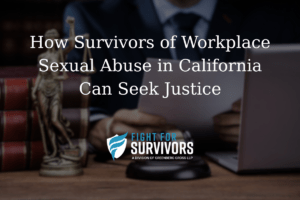
Understanding Workplace Sexual Abuse and Your Rights
Experiencing sexual abuse in the workplace is devastating, leaving lasting emotional, physical, and financial scars. Survivors often struggle with feelings of fear, shame, and uncertainty about their legal rights. However, California provides robust legal protections to help survivors hold perpetrators and employers accountable. Whether the abuse occurred recently or in the past, there are multiple legal avenues available to seek justice and obtain compensation.
Survivors of workplace sexual harassment claims should understand their rights under California law, the statute of limitations, and the legal options available to pursue justice, from filing a sexual harassment lawsuit to pursuing a civil lawsuit. This guide explains the process and how to take action.

Legal Protections for Workplace Sexual Abuse Survivors in California
Contact Us For A Free Legal Consultation. No Fee.
Call (833) 55-FIGHTCalifornia has some of the strongest protections for survivors of sexual abuse in the workplace. The state’s laws are designed to hold employers accountable for fostering a safe work environment and to ensure that sexual abuse survivors have the ability to seek legal recourse.
- California’s sexual harassment laws prohibit any form of workplace harassment that is based on sex, including unwanted sexual advances, sexual favors, and sexually degrading words.
- The California Civil Rights Department (CRD) enforces fair employment laws that protect workers from discrimination and harassment.
- Survivors of sexual abuse can file a sexual harassment complaint with the CRD or the Equal Employment Opportunity Commission (EEOC).
- In cases where a crime has been committed, survivors can also pursue criminal charges against the perpetrator.
These protections apply to all employees, regardless of job title or industry, ensuring that no worker has to endure a hostile work environment.
The Legal Process for Holding Abusers and Employers Accountable
Filing a Workplace Sexual Harassment Complaint
If you have been sexually harassed or assaulted at work, one of the first steps is filing a complaint. Under California law, employees who experience sexual harassment can take action through:
- Internal Complaints – Many employers have procedures for reporting harassment. If your company has a human resources department, you may be required to file a report internally before taking legal action.
- California Civil Rights Department Complaint – Survivors can file a formal sexual harassment complaint with the CRD, which investigates workplace harassment claims and can take legal action against employers.
- Equal Employment Opportunity Commission (EEOC) Complaint – A federal complaint can be filed with the EEOC if the harassment violates federal law.
Employers are legally required to investigate complaints and take corrective action to stop harassment. If they fail to do so, survivors may have grounds to file a sexual harassment lawsuit.
Pursuing a Civil Lawsuit for Workplace Sexual Abuse
For survivors seeking compensation beyond what an employer may offer, filing a civil lawsuit is an option. A civil lawsuit allows survivors to hold both the perpetrator and the employer responsible for the harm they suffered. Through a civil suit, survivors may be able to recover:
- Medical expenses related to physical or psychological injuries
- Lost wages and lost earning capacity if the harassment affected job performance
- Emotional distress damages for the trauma caused by the abuse
- Punitive damages if the employer ignored or enabled harassment
In California, survivors can file a civil lawsuit anytime within the statute of limitations, though the time frame varies depending on the case.

Understanding the Statute of Limitations for Workplace Sexual Abuse Cases
The statute of limitations determines how long a survivor has to file a legal claim. California has recently expanded protections for survivors by extending the time limits for filing lawsuits:
- For workplace sexual harassment claims, survivors typically have three years from the last incident of harassment to take legal action.
- If the case involves sexual assault, survivors may have a longer period under California’s sexual abuse laws.
Because laws regarding the statute of limitations can be complex, seeking legal advice from experienced sexual harassment lawyers is crucial.
Options for Survivors of Childhood Sexual Abuse in the Workplace
Some survivors may have experienced childhood sexual assault in a workplace setting, such as in industries where minors are employed. The California Child Victims Act allows childhood sexual abuse survivors to file lawsuits even decades after the abuse happened.
Employers that failed to protect young workers from sexual predators or ignored complaints of inappropriate conduct can be held accountable through both civil and criminal legal action. Survivors of childhood sexual assault may be eligible for compensation for medical expenses, emotional distress, and other damages.
Seeking Compensation for Workplace Sexual Abuse
Workplace sexual abuse can result in significant financial hardships. Survivors who pursue legal action may be able to seek compensation for:
- Medical expenses for therapy, counseling, and medical treatment
- Lost wages due to job loss or reduced work capacity
- Emotional distress caused by the trauma of the abuse
- Legal costs associated with filing a civil suit
- Other damages depending on the nature of the abuse
In some cases, survivors may also qualify for compensation through sex abuse claims filed under California sexual abuse laws.
How to Take the Next Step Toward Justice
If you or a loved one has been sexually assaulted or harassed at work, you have the right to take legal action. Whether the abuse happened recently or years ago, survivors of sexual abuse can hold perpetrators and employers accountable through civil lawsuits, workplace harassment claims, and criminal charges.
Every survivor’s experience is unique, and the legal process can feel overwhelming. Speaking with a law firm that specializes in sexual abuse cases can provide clarity on your options and help you navigate the path toward justice.
Frequently Asked Questions
1. What should I do if I was sexually harassed at work?
Document the harassment, report it to your employer if possible, and consider filing a complaint with the California Civil Rights Department. If your employer fails to act, you may have grounds for a lawsuit.
2. How long do I have to file a lawsuit for workplace sexual abuse?
The statute of limitations varies. Workplace harassment claims typically must be filed within three years, but sexual assault cases may have extended time limits. Seek legal advice to determine your eligibility.
3. Can I file a civil lawsuit against my employer for sexual harassment?
Yes. If your employer failed to prevent harassment or retaliated against you for reporting it, you may be able to file a civil lawsuit and seek compensation.
4. What damages can I recover in a sexual harassment lawsuit?
You may be entitled to compensation for lost wages, medical expenses, emotional distress, and punitive damages.
5. Can I file a claim if the abuse happened years ago?
Yes. California has extended the statute of limitations for many sexual abuse claims, including childhood sexual assault and workplace harassment. Survivors should consult a lawyer to determine their options.
Experienced Attorneys Who Will Listen And Fight For You
Speak To An Attorney Now »